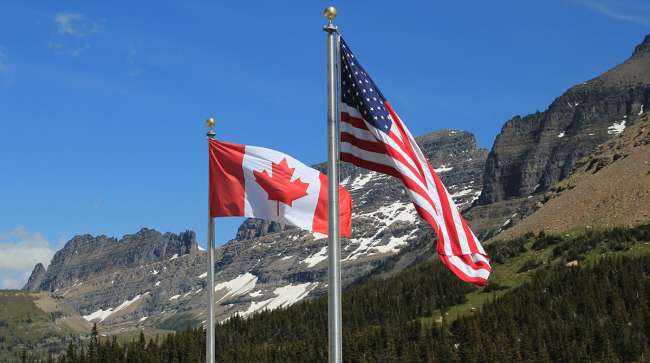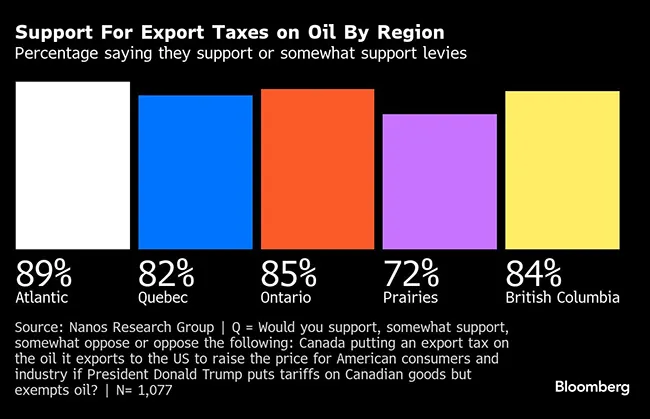Bloomberg News
Canadians Support Using Oil as Weapon in Trump Trade War

[Stay on top of transportation news: Get TTNews in your inbox.]
There is strong nationwide support among Canadians for putting export taxes on oil shipments if needed to retaliate against U.S. President Donald Trump’s tariffs, a new poll suggests.
Export taxes on energy have been considered politically divisive in Canada, but the robust backing shows the level of anger among the Canadian public over Trump’s actions — and potentially gives Justin Trudeau’s government greater license to threaten the levies if Trump revives the tariffs next month.
Overall, 82% of Canadians support unilaterally raising the price on oil exports to the U.S. if Trump tariffs Canadian goods but exempts oil, according to a poll by Nanos Research Group conducted for Bloomberg News. The survey was conducted Jan. 31-Feb. 3 among 1,077 respondents, and is considered accurate within 3 percentage points, 19 times out of 20.
The poll found 72% support among people living in the western Prairie provinces, where Canada’s oil resources are concentrated. The premiers of both Alberta and Saskatchewan have publicly opposed any use of export taxes, but the survey suggests the leaders are out of step with most of their residents.

Nearly 90% of people in the Atlantic provinces — which have offshore oil projects — support using export taxes if necessary, which is the strongest regional level of support found by the poll.
Furthermore, the poll found 79% of people nationwide support retaliatory tariffs on U.S. imports, even if it means Canadians will end up paying higher prices for goods.
Oil is Canada’s single biggest point of leverage with the U.S., which imports about 4 million barrels a day from its northern neighbor. Many U.S. refineries, particularly in the Midwest, rely on heavy crude oil sourced from Canada and do not have easy replacements for it.
On Feb. 1, Trump signed an executive order that would levy 25% duties on all Canadian exports to the U.S. except for the broad category of “energy,” which would be tariffed at a lower rate of 10%. Trump declared the tariffs were necessary to stop the flow of fentanyl from Canada into the U.S., despite the fact that U.S.-collected statistics show no evidence this is a significant problem.
The tariffs were delayed by 30 days on Feb. 3 after Trump spoke with Trudeau twice by phone, and said he was satisfied by Canadian actions such as appointing a “fentanyl czar” and adding more border security resources. Trudeau also agreed to pause retaliatory tariffs on C$155 billion ($108 billion) worth of U.S. goods.
Host Seth Clevenger and TT's Connor Wolf discuss CES 2025 and the emerging technologies that could push the trucking industry forward.. Tune in above or by going to RoadSigns.ttnews.com.
However, Trump has explicitly kept the tariff threat on the table, saying the coming weeks will be used “to see whether or not a final economic deal with Canada can be structured.”
Bloomberg has previously reported the Canadian government has examined the use of export taxes on key commodities such as oil, uranium and potash if Trump attempted to put economy-wide tariffs on Canada but exempted those resources due to America’s reliance on them.
Trudeau has struck a cautious tone. When he announced Canada’s retaliation package on Feb. 1, he said it was important that “no one region of the country or one industry carries a larger burden than anyone else.”
“We will not be moving forward on issues that further divide the country, which is why we’re working with all premiers to look at different ways we can encourage the Americans to step back from these trade actions,” he said.
Want more news? Listen to today's daily briefing above or go here for more info
To be sure, export levies on oil would likely be a last resort for Canada in a trade war with the U.S., as they would harm a major economic driver in the northern nation and potentially raise the cost of Canadian oil that runs through the U.S. via Enbridge Inc.’s Line 5 pipeline en route to Ontario and Quebec.
Alberta Premier Danielle Smith — whose province is home to the lion’s share of Canada’s oil deposits — has reacted furiously to the idea of export taxes, and refused to sign a joint statement by Canadian political leaders last month because it didn’t rule out measures to curb energy exports to the U.S.
“Until these threats cease, Alberta will not be able to fully support the federal government’s plan in dealing with the threatened tariffs,” Smith said when rejecting the statement in January.





